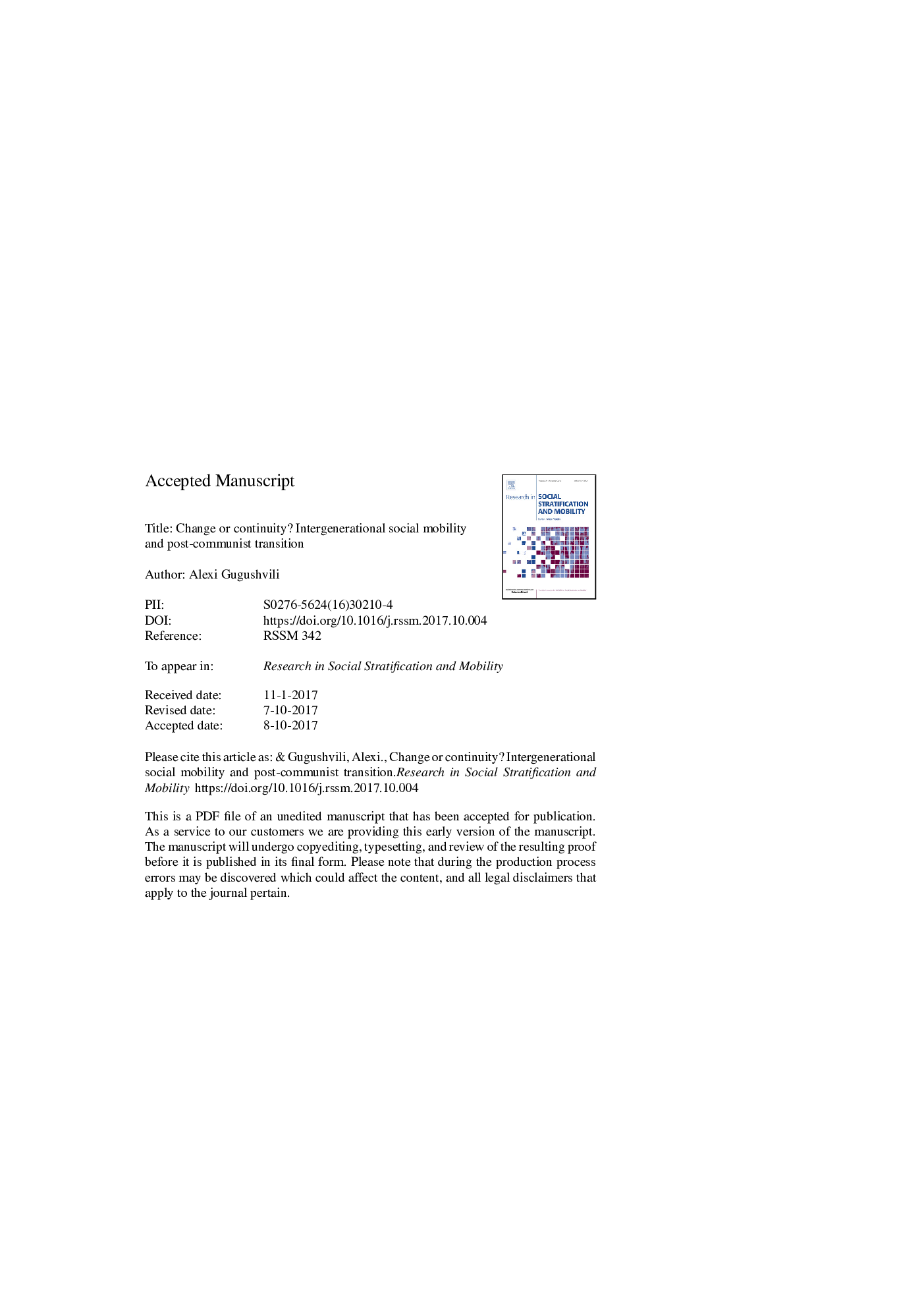| کد مقاله | کد نشریه | سال انتشار | مقاله انگلیسی | نسخه تمام متن |
|---|---|---|---|---|
| 7409942 | 1481560 | 2017 | 45 صفحه PDF | دانلود رایگان |
عنوان انگلیسی مقاله ISI
Change or continuity? Intergenerational social mobility and post-communist transition
ترجمه فارسی عنوان
تغییر یا تداوم؟ تحرک اجتماعی بین نسلی و انتقال پس از کمونیست
دانلود مقاله + سفارش ترجمه
دانلود مقاله ISI انگلیسی
رایگان برای ایرانیان
کلمات کلیدی
تحرک اجتماعی، شانس زندگی، پست کمونیسم، پایتخت فرهنگی، سرمایه اقتصادی
ترجمه چکیده
تغییر رژیم در جوامع بعد از کمونیسم، اهمیت زیادی برای پژوهش در طبقه بندی و تحرک اجتماعی دارد. با این وجود، ادبیات موجود پاسخ قطعی نمی دهد اگر تفاوت های متقابل ملی در تحرک اجتماعی توسط ممانعت های کمونیستی یا راه های متفاوتی که این کشورها در جریان گذار به نظام سرمایه داری دنبال می کنند تعیین شوند. فرض بر این است که نابرابری درآمد بالاتر و کاهش کلی سلامت مادی، اهمیت سرمایه های اقتصادی والدین را افزایش می دهد، در حالی که نقش نسبی سرمایه فرهنگی والدین در شانس زندگی فرزندان کاهش می یابد. برای 24 جوامع در اروپای مرکزی و شرقی و قفقاز جنوبی، شواهدی راجع به نقش تعیین کننده ریشه های اجتماعی، به خصوص آموزش والدین، در پیش بینی اهداف آموزشی و حرفه ای افراد پیدا می کنم. با این حال، تغییرات قابل توجه و سیستماتیک در تحرک اجتماعی بین نسلی از همتایان قبل و بعد از انتقال وجود ندارد. یافته های مشتق شده به ویژگی های جایگزین ریشه های اجتماعی و مقصد است. مسلما تفاوت های مربوط به رابطه بین نسلی میان موقعیت اجتماعی و اقتصادی والدین و فرزندان ناشی از اختلافات تاریخی در دوره کمونیستی به جای پیامدهای تحولات خاص در گذار پس از کمونیسم است.
موضوعات مرتبط
علوم انسانی و اجتماعی
اقتصاد، اقتصادسنجی و امور مالی
اقتصاد، اقتصادسنجی و مالیه (عمومی)
چکیده انگلیسی
Regime change experienced in post-communist societies is of great significance for research in social stratification and mobility. Nonetheless, the existing literature does not provide a clear answer if cross-national differences in social mobility are determined by communist legacies or by the divergent paths these countries followed in their transition to the capitalist system. It is hypothesised that higher income inequality and an overall decline in material wellbeing would increase the importance of parental economic capital, whereas the relative role of parental cultural capital in offspring's life chances would decline. For 24 societies in Central and Eastern Europe and the South Caucasus, I find evidence on the decisive role of social origins, particularly parental education, in predicting individuals' educational and occupational attainment. However, significant and systematic changes in intergenerational social mobility from pre- to post-transitional cohorts are not observed. The derived findings are robust to alternative specifications of social origins and destinations. Arguably, differences in intergenerational links between parents' and offspring's socio-economic status resulted from historical discrepancies in the communist period rather than the consequences of idiosyncratic developments in post-communist transition.
ناشر
Database: Elsevier - ScienceDirect (ساینس دایرکت)
Journal: Research in Social Stratification and Mobility - Volume 52, December 2017, Pages 59-71
Journal: Research in Social Stratification and Mobility - Volume 52, December 2017, Pages 59-71
نویسندگان
Alexi Gugushvili,
